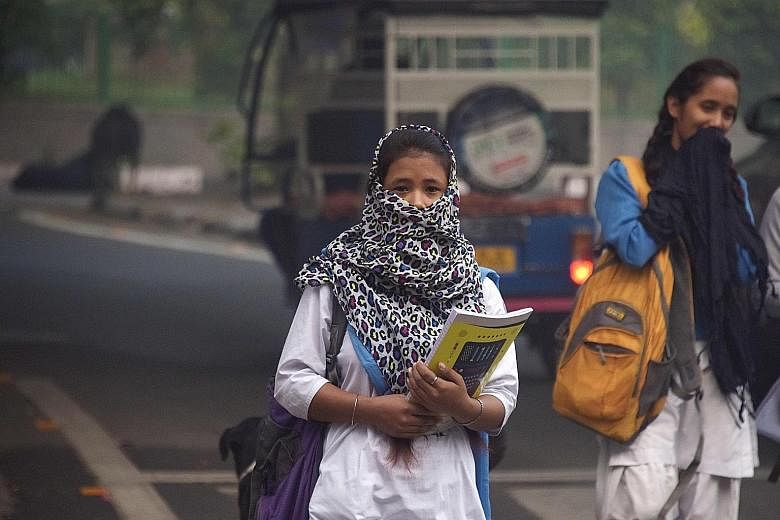India's capital city continues to be enveloped in a grey smog, with pollution levels remaining in the severe category.
This is in spite of the implementation of several emergency measures, including a ban on all construction activity and sprinkling of water on roads.
The capital city saw PM2.5 levels - a measure of fine particle matter linked to higher rates of chronic bronchitis, lung cancer and heart disease - go up to 500 in some places yesterday.
The Supreme Court yesterday called it an "emergency-like situation". But primary schools, which had been shut for a week by the authorities due to high pollution levels, reopened on the same day.
Children going to school could be seen wearing masks as the India Meteorological Department predicted levels would start receding by last night.
The department also said rain would start to clear the air over the next two days.
Ms Ameeta Mulla Wattal, principal of Springdales School, said it had nebulisers, oxygen tents and cylinders ready.
"The tragedy is that one has got used to working and living in this difficult situation. It seems to have become another reality."
In the last week, pollution in the capital city hit the severe level on the back of stubble burning after the harvest by farmers in the neighbouring states of Punjab and Haryana, and amid weather conditions labelled adverse by the Met department.
The lack of winds led to pollutants being trapped over the city and this added to existing pollution within the city.
The rising pollution levels saw the Environment Pollution (Prevention and Control) Authority (EPCA) issue a series of instructions to Delhi authorities, including stopping construction works and the use of coal and firewood in hotels and restaurants.
While these measures were implemented last week, experts said that there has been no immediate effect.
Professor Mukesh Khare from Delhi's Indian Institute of Technology, and a member of the EPCA, noted that more research is needed to fine-tune the new Graded Response Action Plan, which came into effect this year, for Delhi.
The plan calls for the monitoring of air quality from various stations located across Delhi and mandates four different categories of action when air quality goes from moderate to poor to emergency.
Prof Mukesh also questioned compliance and monitoring by the authorities.
"How serious are they? We needed to be ready for this situation two months back."
Environmentalists said a long-term plan is needed.
"The whole year nothing happened and suddenly all this. I think the situation is going to worsen in the coming years," said Mr Vikrant Tongad of the Social Action for Forest and Environment: Safe Green.
Vehicular pollution had to be controlled, among other things, he said.
"People are more aware of pollution and its harmful effects year by year. Awareness is going up but pollution level is not coming down."

